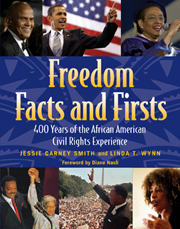Black First of the Day
Who was the U.S. Supreme Court's first black justice?
- He devoted his legal career to find solutions to the problems of civil rights and individual liberties.
- He was denied admission to the University of Maryland Law School because of his race.
- He graduated magna cum laude and first in his Howard University Law School class in 1933.
- He spent twenty-three years as chief attorney for the NAACP.
1967
Thurgood Marshall (1908-1993)
Thurgood Marshall (1908-1993) became the first black U.S. Supreme Court justice. For twenty-three years, Marshall was chief attorney for the NAACP. While there, he distinguished himself for using the legal system to break racially discriminatory practices in voting, housing, transportation, and other areas. He left the NAACP and was confirmed on September 11, 1962, as judge on the U.S. Court of Appeals, Third Circuit. On August 11, 1965, he was confirmed as solicitor general. He served the courts with distinction, and then took a seat on the U.S. Supreme Court on August 2, 1967. When President Lyndon B. Johnson nominated him to the post, four senators from the South vehemently opposed his confirmation; he was confirmed by a vote of 69 to 11. He served on that court until 1991, when he retired due to advancing age and health problems. Marshall was an outspoken member of the court who never hesitated to make his opinions known, especially when the subject had to do with civil rights. Born in Baltimore, Marshall graduated from Lincoln University in June 1930. Denied admission to the University of Maryland Law School because of his race, Marshall enrolled in Howard University Law School in Washington, D.C. There he established a good relationship with Charles Hamilton Houston, then vice-dean of the law school and later the first black lawyer to win a case before the U.S. Supreme Court. Marshall graduated magna cum laude and first in his class in 1933. He was admitted to the Maryland bar in 1933 and maintained a private law practice in Baltimore from 1933 to 1936. In 1934 he was appointed counsel for the Baltimore chapter of the NAACP while continuing his practice. Still incensed over the University of Maryland's rejection of his application, with the assistance of Charles Hamilton Houston he successfully sued the university in 1935 to admit Donald Murray, another black student. Marshall's devoted his entire legal career to find a working solution to the problems of civil rights and individual liberties.
Sources: Contemporary Black Biography, vol. 1, pp. 146-49; Smith, Notable Black American Men, pp. 762-67; Williams, Thurgood Marshall.
From Black Firsts: 4,000 Ground-Breaking and Pioneering Events by Jessie Carney Smith, © 2013 Visible Ink Press®. A celebration of achievement, accomplishments and pride.
| < Previous Fact | Next Fact > |
Dig deeper with these related titles:
 |
Black Firsts: 4,000 Ground-Breaking and Pioneering Events, Third Edition Achievement engenders pride, and the most significant accomplishments involving people, places, and events in black history are gathered in Black... Read More » |
ISBN: 9781578593699 $34.95 |
 |
African American Almanac: 400 Years of Triumph, Courage and Excellence A wealth of milestones, inspiration, and challenges met. . . The most complete and affordable single-volume reference of African... Read More » |
ISBN: 9781578593231 $29.95 |
 |
Freedom Facts and Firsts: 400 Years of the African American Civil Rights Experience Spanning nearly 400 years from the early abolitionists to the present, this guide book profiles more than 400 people, places, and events that have... Read More » |
ISBN: 9781578591923 $44.95 |
 |
Black Heroes "If there is no struggle, there is no progress," wrote Frederick Douglass. "This struggle may be a moral one; or it may be a physical one; or it may... Read More » |
ISBN: 9781578591367 $69.95 |




